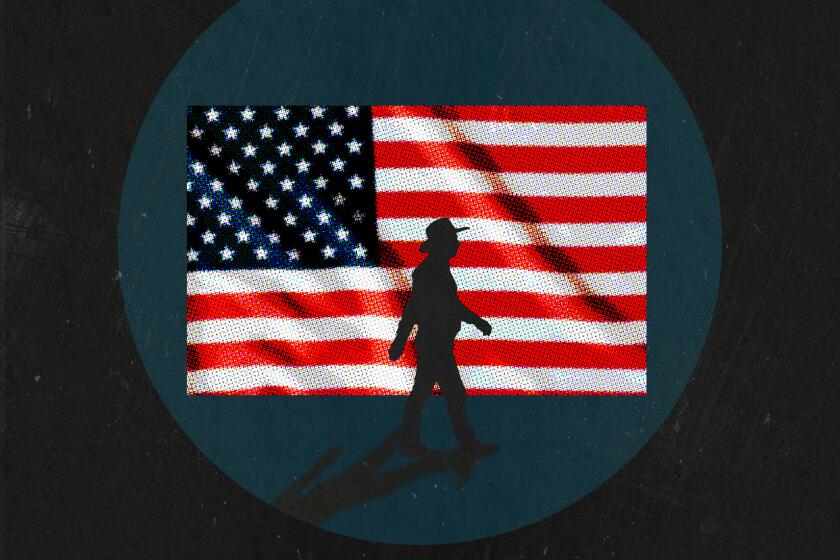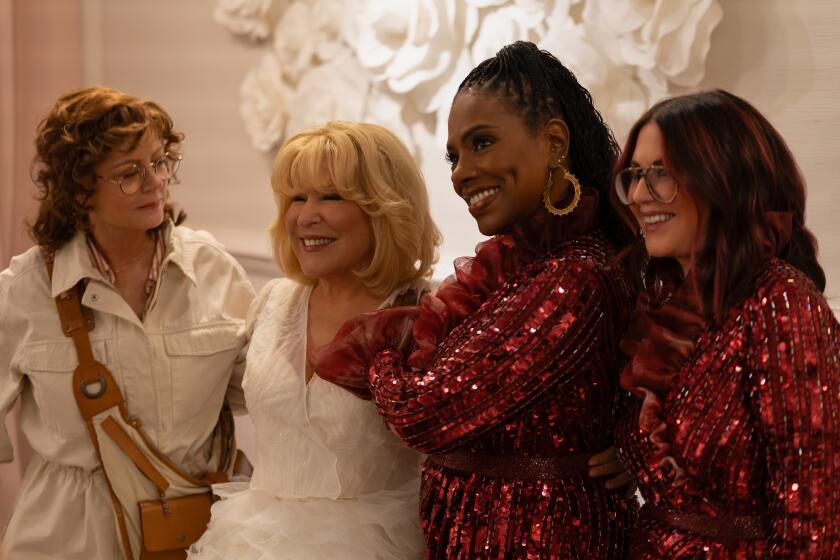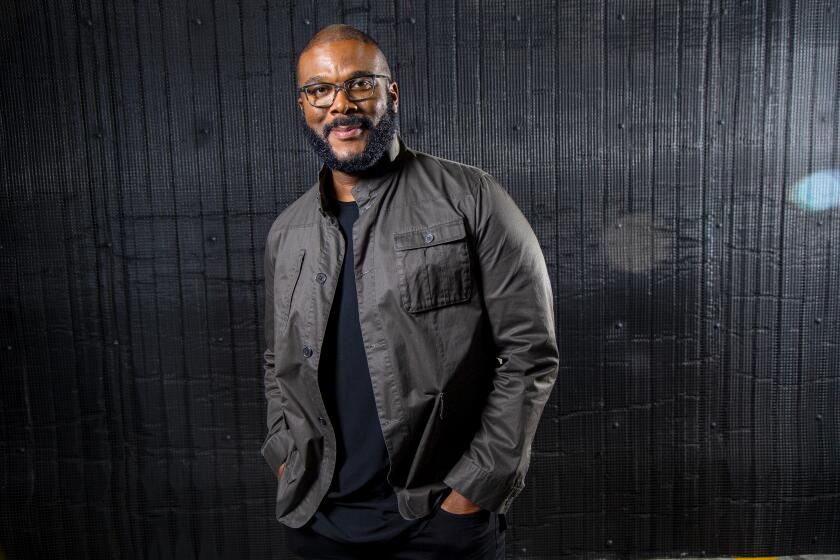Film Critical of U.S. Policy Wins the Palme d’Or
It’s hard to render Michael Moore speechless, but the jury at the Cannes Film Festival did just that Saturday when it awarded the director the coveted Palme d’Or for his incendiary new political documentary, “Fahrenheit 9/11.”
“What have you done?” were the first words out of a flabbergasted Moore’s mouth. “I am completely overwhelmed by this.” Then, looking at panel President Quentin Tarantino and the rest of the Cannes jury, which has more Americans than any other nationality, he added suspiciously, “You just did this to mess with me.” In the audience, Miramax Films Chairman Harvey Weinstein, whose company backs both Tarantino and Moore, stood with his hand on his head, equally stunned.
The nine-member jury’s decision to give Moore the top prize further raises the profile of an unabashedly partisan indictment of the Bush administration and its policies before and after Sept. 11.
Moore had returned to the United States, where his daughter was receiving a master’s degree but was called back to France by festival officials. He won a prize at Cannes in 2002 for “Bowling for Columbine,” but no documentary had won the festival’s top honor since Jacques Cousteau’s “The Silent World” nearly half a century ago.
Still without American distribution after the Walt Disney Co. forbade subsidiary Miramax from releasing it, “Fahrenheit 9/11” also took the prestigious international critics award. It has been greeted by the festival’s European contingent with near messianic fervor, and there was sustained applause when this award was announced at the Palais des Festivals. Some earlier winners praised Moore and denounced Bush.
Almost from its inception, the film has generated a crescendo of publicity in the weeks leading up to the festival as Moore and Weinstein made the most of Disney’s rejection of the movie. Moore wants to have it in U.S. theaters by Independence Day and out on DVD before the presidential election, and Weinstein is in negotiations to buy the film himself and arrange for its distribution. Canadian-based Lions Gate Films, U.S. independent Newmarket Films (which released another movie that generated a lot of controversy, Mel Gibson’s “The Passion of the Christ”), NBC Universal’s Focus Features and Viacom’s Paramount Classics division are believed to be interested in the U.S. distribution rights.
A Palme d’Or does not always affect a film’s box-office performance, but in this case it probably will bolster the movie’s profile.
Earlier in the evening, Jonas Geirnaert, the Belgian winner of a short film award, used his acceptance speech to praise Moore and pleaded, “If anyone is watching from the United States, please don’t vote Bush.” Actor Tim Roth, president of the Camera d’Or jury (which gave its best first-film prize to the Israeli film “Or”), added: “I compliment that young man and I agree wholeheartedly. People should not be voting for George Bush.”
Once he calmed down, Moore said he was “happy to announce that we have a distributor in Albania. Now every country in the world can see this film except one. I have sneaking suspicion that you’ve ensured that the American people will see this film. You’ve put a huge light on this, you’ve taken truth out of the closet. A Republican president once said, ‘If you just give people the truth the Republic will be saved.’ That was Abraham Lincoln, a different kind of Republican than George Bush.”
Aside from Moore’s film, the internationally diverse jury’s awards were all over the map. If there was a trend, it was to acknowledge the films from Asia in competition, as four out of six entrants from that continent were given awards. The runner-up Grand Prix went to the South Korean film “Old Boy,” directed by Park Chan Wook.
A violent and sensationalistic film by a director who’s been called the Korean Tarantino, “Old Boy” is a story of a man who seeks revenge after being incarcerated in a makeshift prison for 15 years. The actor who played the prisoner, Choi Min Sik, mentioned “the four living octopuses who gave their lives for the film” when he ate them.
Both acting awards went to Asians. Maggie Cheung won for “Clean,” French director Olivier Assayas’ tale of a junkie rocker trying to straighten out and reconnect with her son, and 12-year-old Yagira Yuya was voted best actor for Japan’s “Nobody Knows,” a delicate, casually heartbreaking film about four children trying to survive after being abandoned by their mother. The film’s director, Kore-eda Hirokazu, accepted for the boy, who he said had returned to Japan to take exams.
Though Wong Kar-wai’s much anticipated “2046” came away empty-handed, a jury prize was given to the Thai film “Tropical Maladies,” directed by Apichatpong Weerasethakul.
Another jury prize was given to American actress Irma P. Hall for Joel and Ethan Coen’s “The Ladykillers.” The award for best director was inexplicably given to France’s Tony Gatlif for his wildly over-indulgent “Exils,” about “children of the diaspora” who return to Algeria.
One prize everyone applauded was the screenplay award to writer-actors Agnes Jaoui and Jean-Pierre Bacri for “Comme Une Image,” or “Look at Me,” directed by Jaoui. An acerbic French comedy of manners, or their absence, about a sacred monster of a novelist and his overweight daughter, this intelligent, well-written and smartly acted film is shrewd and sassy about the dynamics of celebrity and self-image.
The best film not recognized by the jury was Lucrecia Martel’s “La Nina Santa” (The Holy Girl), the Argentine director’s follow-up to her well-regarded “La Cienega.” A film of great subtlety and intensity, it completely understands the potent nexus of sexuality and religion in the lives of two teenage girls.
Every year, one film at Cannes is so strong that everyone wonders why it wasn’t included in the official competition. This year, that description fit “Moolaade,” winner of the Prix Un Certain Regard, and the latest work from the 81-year-old dean of African filmmakers, Senegal’s Ousmane Sembene.
Sembene, a master of dramatic storytelling and a director for nearly 40 years, has never shied from provocative subjects, and “Moolaade,” which deals with female genital excision, is no exception.
The film details the conflict within a village when a handful of young girls flee a circumcision ceremony known as purification and seek sanctuary (moolaade in the Bambara language) with a woman who opposed the procedure for her own daughter.
Just as accomplished but completely different in tone was the delightful “Whiskey,” co-directed by Juan-Pablo Rebella and Pablo Stoll and winner of the international critics prize for the esoteric Un Certain Regard section of the festival.
A new film set in Montevideo, Uruguay -- not exactly the epicenter of world cinema -- “Whiskey” is a gently absurdist comedy about intimacy and loneliness in a world that codirector Stoll describes as containing “two 60-year-old Jewish brothers, a woman and a stocking factory.” Droll and delicately told, “Whiskey” surprised audiences with the confidence of its melancholy humor.
Asian films were a strong presence outside the competition as well. Zhang Yimou’s much-heralded “House of Flying Daggers,” a Chinese martial arts film set in AD 859, displayed considerable action chops and the fine dance moves of star Zhang Ziyi, but its dramatic side did not rise to the same level.
Involving on several levels was “Breaking News,” the latest crime film from Hong Kong veteran Johnnie To. Filled with gorgeous camera moves and crisp gun battles, “Breaking News” has the wit to show cops and robbers battling not only to stay alive but also to stay on message and control the spin of fast-moving events -- an always involving twist on genre material.
Although it got most of the publicity, “Fahrenheit 9/11” was not the only documentary prominently displayed at Cannes, nor even the only political one. Simone Bitton’s “Mur” (“Wall”) examines with visual coolness and verbal passion the barrier being built between Israel and the West Bank because, as one young boy explains, “Arabs shoot at us, so we hide behind the wall.”
Two of the best documentaries at Cannes would make an excellent if overly long double bill. “Z Channel: A Magnificent Obsession” is Xan Cassavetes’ involving chronicle of the life and tragic death of Jerry Harvey, a gifted and obsessive programmer who made the Z Channel a must-see for L.A.’s film elite in the 1980s but couldn’t conquer his own madness.
Clocking in at 3 1/2 hours, Jacques Richard’s irresistible “Henri Langlois: The Phantom of the Cinematheque” took seven years to make and is worth every moment.
Langlois is the patron saint of film preservation, the founder of the Cinematheque Francaise and the pioneer of the notion that everything ever put on film is worth saving. As a saga of an extraordinarily influential, controversial and eccentric life, “Phantom” holds you in your seat despite its daunting length.
“Phantom of the Cinematheque” is also a film made for Cannes, where movie madness of all kinds is welcome. It’s the place where the Independent Film Channel hired a team of synchronized swimmers for a 10th anniversary party; where Dreamworks imported Will Smith, Jack Black and Angelina Jolie to amusingly publicize its forthcoming “Shark Tale,” where the reopening of the Ariana, the biggest theater in Kabul, was first announced to the world.
It’s also a place where a man who calls himself Ivan Inversion can be found suspended upside down from a tree as he plays guitar and sings the Kinks’ “In the Summertime.” Why? Well, Ivan Inversion says -- once he’s upright -- “I’ve made a film. It’s called ‘English Eccentrics.’ ”
Not that we couldn’t have guessed.
*
(BEGIN TEXT OF INFOBOX)
The Cannes judges
President of the Jury
1. Quentin Tarantino, 41, American writer-director of ‘Reservoir Dogs,’ ‘Pulp Fiction’ and ‘Kill Bill.’
Jurors
2. Emmanuelle Beart, 39, French actress whose films include ‘Manon of the Spring,’ ‘Mission: Impossible’ and ‘Eight Women.’
3. Edwidge Danticat, 35, Haitian-born American author of ‘The Dew Breaker,’ ‘After the Dance: A Walk Through Carnival in Jacmel, Haiti’ and ‘Breath, Eyes, Memory.’
4. Benoit Poelvoorde, 39, Belgian actor-screenwriter known for ‘Man bites Dog’ and ‘Ghislan Lambert’s Bicycle.’
5. Jerry Schatzberg, 76, American director whose films include ‘Street Smart,’ ‘The Panic in Needle Park’ and ‘The Seduction of Joe Tynan.’
6. Tilda Swinton, 43, British actress whose credits include ‘Young Adam,’ ‘Adaptation,’ ‘The Deep End’ and ‘Orlando.’
7. Tsui Hark, 53, Hong Kong-based Vietnamese writer-director of ‘Time and Tide’ and ‘Knock Off.’
8. Kathleen Turner, 49, American actress whose films include ‘Body Heat,’ ‘Romancing the Stone,’ ‘Prizzi’s Honor’ and ‘The Virgin Suicides.’
9. Peter Von Bagh, 60, Finnish filmmaker, movie critic and film festival programmer. Films include ‘Count’ and ‘When the Heavens Fell.’
*
Sources: Internet Movie Database (www.imdb.com); Festival de Cannes
More to Read
Only good movies
Get the Indie Focus newsletter, Mark Olsen's weekly guide to the world of cinema.
You may occasionally receive promotional content from the Los Angeles Times.







